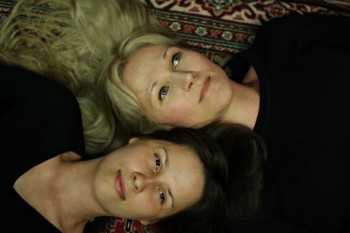Thirsty for poetry
22 May 2014 | This 'n' that

Johanna Venho (above) and Vilja-Tuulia Huotarinen. Photo:
Jano (‘Thirst’) is the name for a new online magazine: according to the writers and poets Johanna Venho and Vilja-Tuulia Huotarinen, its editors, it is a ‘poetry journal for all’ – for poets, the general public, for anybody.
Two issues have been published since November 2013. The theme of the first one is Time, of the second, Place.There are interviews, autobiographical texts, texts by critics and poets.
Jano features new thoughts about poetry and writing, texts by and about poets old or young, Finnish and foreign. The languages, so far at least, are Finnish and Swedish, depending on the language the writer writes in, but for our readers we pick a few samples here:
The poet Ilpo Tiihonen analyses reading poetry in an interview: ‘You can let prose take you on, just float along, whereas poems must be read as if standing up, constantly prepared to take a step to some direction. Either ready for coming or going. The posture while reading a poem differs completely from the reading of a long text. A poem requires activity, transience, ability to let oneself loose.’
For the poet Heli Laaksonen (who writes in her native dialect of the south-western Finland) reading her poetry in public is also what she does for living. In a text she calls her ‘monologue’ she notes that ‘this year of those who have come to interview me two had read any of my books.
‘The flimsiness of journalistic work may be just a selfish worry of an author, but can the quality of what’s currently published really satisfy the reader? A recent example: a journalist from an evening paper comes backstage ten minutes before a gig. He wants to write a personal profile. My mind is already occupied by the occasion at hand, in an even drearier space than usually. “Take a look at my homepage at least so you won’t have to pinch your information off Wikipedia.” “Haha, no Wikipedia needed, I’ve got this interview from this women’s magazine, I have three little questions here. How’s the renovation going on? I hear you don’t like cooking? Are you planning to have kids?” “I’m sorry but I have to go on stage now.” ’
The Icelandic writer and poet Kári Tulinius once chose to write a manifesto in which she condemned the material nature of art and literature. Text is difficult to destroy. ‘The human body decays and returns its molecules to the cycle of nature. The same cannot be said of the work authors leave behind. Their art and their writing were of great importance to their contemporaries, but nowadays they mostly occupy space in thoughts and in the real world. Everyone who has visited museum or library stores cannot but marvel at the incredible amount of cultural junk left behind by our foremothers and -fathers.
‘Write poems with water, let them decay, returning their molecules to the nature of the mind.’
No comments for this entry yet
